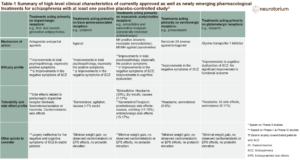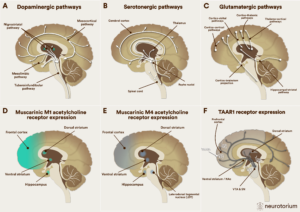Index for
slide deck
Title
-1024x576.jpg)
Course, Natural History and Prognosis
This slide covers course, natural history and prognosis of Schizophrenia. Schizophrenia is a progressive and recurring disease characterized by multiple psychotic relapses.
This slide deck is schedules for update summer 2022.
Course of Schizophrenia
-1024x576.jpg)
Course of Schizophrenia
-1024x576.jpg)
Schizophrenia is a heterogeneous disease with many dimensions
-1024x576.jpg)
Schizophrenia: A broad range of symptoms
Source (slide): APA 2013, Pages 99–102; APA 2000, Page 299; Wilk et al. Neuropsychology 2005; 19 (6): 778–786, Page 778; NICE clinical guideline 178, Page 4.
Source (notes): APA 2013, Pages 99–102; APA 2000, Page 299–302; Wilk et al. Neuropsychology 2005; 19 (6): 778–786,…
-1024x576.jpg)
Schizophrenia progression may lead to functional decline
Key message: Schizophrenia is a progressive and recurring disease characterized by multiple psychotic relapses. Following a relapse, patients often fail to recover to baseline health and this may lead to functional decline.
Background:
- The majority of patients with schiz…
-1024x576.jpg)
Typical Course of Schizophrenia
Review as stated on slide.

Please note, this slide builds
Key message: Many patients experience symptoms that are not fully controlled with treatment, with social withdrawal and impoverished thought being the two most common negative symptoms, and disordered thought and bizarre behavior the two mos…

Symptoms that are not fully controlled are significantly associated with impaired global functioning
Key message: In a study of patients in remission, those with residual symptoms had significantly worse global functioning that those without residual symptoms.
Background:
- Patients (aged 18–65) in remission with and without residual symptoms were compared regarding psych…

Disorganization, a common residual symptom,1 is associated with impaired community functioning
Key message: Conceptual disorganization is a common residual symptom in patients with schizophrenia, and is a reliable predictor of several aspects of community functioning, as measured by the Life Skills Profile (which was specifically designed to assess constructs of re…
-1024x576.jpg)
Positive symptoms of schizophrenia are inversely correlated with ability to function
Key message: Increase in positive symptoms is directly correlated with a reduction in functional capacity. The correlation between positive symptoms and depression is predictive of impairment in real-world performance measures (as measured by interpersonal skills, communi…
-1024x576.jpg)
Primary negative symptoms of schizophrenia can impact domains of functioning directly1
Key message: Negative symptoms and cognitive deficits can cause patients functional impairment. Primary negative symptoms of schizophrenia can impact different domains of functioning directly, including interpersonal relations, use of common objects and activities, and in…
-1024x576.jpg)


-1024x576.jpg)
-1024x576.jpg)
-1024x576.jpg)
-1024x576.jpg)
-1024x576.jpg)
-1024x576.jpg)
-1024x576.jpg)


-1024x576.jpg)
-1024x576.jpg)
-1024x576.jpg)
-1024x576.jpg)
-1024x576.jpg)
-1024x576.jpg)
-1024x576.jpg)
-1024x576.jpg)
-1024x576.jpg)
-1024x576.jpg)
-1024x576.jpg)

-1024x576.jpg)
-1024x576.jpg)

-1024x576.jpg)
-1024x576.jpg)
-1024x576.jpg)
-1024x576.jpg)
-1024x576.jpg)




-1024x576.jpg)
-1024x576.jpg)

-1024x576.jpg)
-1024x576.jpg)

-1024x576.jpg)
-1024x576.jpg)
-1024x576.jpg)
-1024x576.jpg)
-1024x576.jpg)
-1024x576.jpg)
-1024x576.jpg)


-1024x576.jpg)
-1024x576.jpg)
-1024x576.jpg)
-1024x576.jpg)
-1024x576.jpg)
-1024x576.jpg)
-1024x576.jpg)
-1024x576.jpg)
-1024x576.jpg)

-1024x576.jpg)
-1024x576.jpg)
-1024x576.jpg)

-1024x576.jpg)
-1024x576.jpg)

-1024x576.jpg)
-1024x576.jpg)


